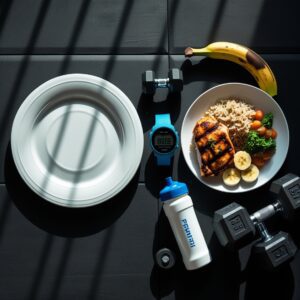In the world of fitness and sports, new trends pop up all the time—some stick, some fizzle out. One trend that’s been gaining serious attention is intermittent fasting (IF). From fat loss to mental clarity, its supposed benefits are everywhere. But when it comes to athletes and people who train regularly, one question remains:
Can intermittent fasting help—or hurt—your performance?
Let’s break it down.
💡 What is Intermittent Fasting?
Intermittent fasting isn’t about what you eat—it’s about when you eat. The most common IF methods include:
16:8 method: Fast for 16 hours, eat within an 8-hour window
5:2 method: Eat normally for 5 days, reduce calories to 500–600 on 2 non-consecutive days
OMAD (One Meal a Day): Fast for 23 hours, eat all calories in 1 hour
⚡ The Potential Benefits for Athletes
1. Fat Loss Without Losing Muscle
For athletes trying to cut weight or lean out, IF can help burn fat while maintaining muscle mass—if protein intake is kept high and training is structured right.
2. Improved Insulin Sensitivity
Better insulin response can mean better nutrient absorption and potentially better recovery post-training.
3. Mental Clarity and Focus
Many people report better concentration and reduced mental fog when training fasted, especially in low- to moderate-intensity sessions.
🧱 The Risks and Limitations
1. Decreased Performance in High-Intensity Training
Fasted workouts might be fine for light cardio, but if you’re lifting heavy, sprinting, or playing competitive sports, low glycogen levels could lead to early fatigue.
2. Muscle Breakdown
If you’re not eating enough protein during your eating window—or training too hard without proper fuel—you could lose muscle over time.
3. Recovery May Suffer
Post-workout meals are essential. Delaying food intake after tough sessions can slow recovery, increase soreness, and affect gains.
🤔 Should You Try Intermittent Fasting as an Athlete?
It depends on your goals, sport, and lifestyle.
Great for: Athletes aiming for fat loss, those with a light to moderate training schedule, or people looking to simplify eating habits
Risky for: High-level athletes, bodybuilders in bulking phases, or those training multiple times a day
✅ Tips for Doing It Right
Plan your training around your eating window
Prioritize protein intake and nutrient-dense meals
Stay hydrated during fasting periods
Listen to your body—if you feel weak or overly fatigued, adjust!
🏁 Final Thoughts
Intermittent fasting isn’t a one-size-fits-all approach. For some athletes, it can be a tool to burn fat, improve focus, and simplify life. For others, it might limit performance and recovery.
Bottom line? Try it out strategically, and if it works for your body and training style, stick with it. If not—ditch it. Because in sports, fueling smart is just as important as training hard.

